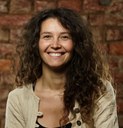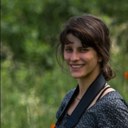Doctoral Researcher

Jan Feigl
A1: Remote sensing-based methods for the assessment of forest structures
Studying forestry during a bachelor's and Master's in Munich, Jan specialised in international forestry systems, nature conservation, and remote sensing. The subject of his master thesis was the erosion risk assessment in Ethiopia based on multispectral satellite data and a land cover classification, which aimed at locating the most urgent areas for forest rehabilitation. Learning about ConFoBi, he was eager to partake in an international research team that incorporated remote sensing applications to help preserve species diversity in European forests. Although using a handheld laser scanner to determine forest structures will be a new challenge, he is already looking forward to fieldwork in the Black Forest.

Martin Denter
A1: Remote sensing-based methods for the assessment of forest structures
Martin studied at Freiburg University, receiving his B.Sc. in Environmental Natural Sciences and Environmental Hydrology. After graduation, he stayed at the University of Freiburg and completed his M.Sc. in Environmental Sciences, focusing on environmental modelling and geographic information systems. At the Forest Research Institute Baden-Württemberg, his work focused on analysing aerial images. Consequently, he wrote his Master's thesis on the classification of deciduous tree species. Building on the work of his predecessor Julian, he will develop methods for investigating microhabitats.

Rose-Marie Oksanen
A2: Retention of structural elements in selectively used forests
Rose-Marie holds a B.Sc. and M.Sc. in Forest Ecology and Management, both completed in University of Helsinki. In her master’s thesis she studied the decision making and attitudes of forest owners. Before joining the team, she gathered some experience working in the private sector of forest industries. In ConFobi Rose-Marie is looking forward to work in a transdisciplinary environment and to find creative ways to combine the knowledge and methods of different disciplines. In her research she will look at how retained habitat trees of different species and dimensions affect the regeneration and regrowth of their surroundings. She will also study the mortality of habitat trees to answer the question of how long different retention elements could provide biodiversity benefits. In Freiburg she loves to cycle to work along the Dreisam river and on the weekends, you will often find her hiking in the Black forest.

Mareike Mohr
A2: The reforestation of damaged spruce stands in a changing climate under the influence of different clearing intensities
Mareike studied the BSc. Forestry and Environment with a minor in Nature Conservation and Landscape Management and the MSc. Forest Sciences with a focus on Wildlife, Vegetation & Biodiversity, both at the Albert-Ludwigs-University of Freiburg. Her MSc. thesis dealt with root trait adaptations of beech and fir in pure and mixed stands under drought stress. She is particularly interested in the consequences of climate change for forests and the possibilities of adapting forests to future conditions. Her dissertation focuses on the reforestation of drought stress- and bark beetle-damaged spruce stands under the influence of different clearing intensities. In particular, she is investigating the retention of structural elements and their effects on the regeneration success. With her research, she wants to develop reliable statements on the future management of dead forests and contribute to an efficient, successful and nature-friendly regeneration of damaged areas. To achieve these goals, it is not only necessary to research plant physiological processes, but also to embed the results in social, ecological and economic issues. For this reason, she is very pleased to be enriched by the interdisciplinary exchange and cooperation with the other ConFoBis.

Theresa Moeller
B1: Epiphyte and microhabitat diversity and function on habitat trees
Theresa obtained her Bachelor's degree in biology and continued in her Master's with a focus in biodiversity, ecology and evolution at the University of Hamburg, Germany. Her focus is on non-vascular vegetation in terms of ecophysiological processes and diversity research. Her Bachelor's thesis involved the examination of diversity and abundance of epiphytic lichens on roadside trees in Hamburg observing differences in the occurrence on native and non-native tree species. Furthermore, she has determined air quality indices using lichens as bioindicators for air pollution. Her Master's thesis focused on N2 fixation through the association of feather mosses and cyanobacteria and its role in boreal forests. More precisely, she examined whether N2 fixation influences metabolic processes of mosses. In addition, she worked with the process-based vegetation model "LiBry" and determined the nitrogen requirements of mosses under varying climate conditions. Besides lichens and bryophytes, she focused on nutrient cycles and acquired different additional perspectives (e.g., soil science, microbiology) on the subject. Her research in ConFoBi addresses her previous focus. In more detail, she will examine the influence of proximity effects on epiphytes diversity within similar or divergent neighboring tree species individuals. Thereby, she will examine a range of potential influencing factors, which will include microclimatic, chemical and ecophysiological analyses.

Dina Emrich
B1: Epiphyte and microhabitat diversity and function on habitat trees
Dina studied biology (BSc) at the University of Gießen with a focus on ecology and microbiology. In her Bachelor's thesis, she investigated the effect of forest structure on bat activity and diversity. She holds an MSc in ecology and microbial biodiversity from the Technical University of Kaiserslautern. In her Master's studies, she focused on cryptogamic organisms like cyanobacteria, green algae, and lichens. Thereby, her interest in lichens from biological soil crusts was awakened. She wrote her Master's thesis on lichens from the Atacama Desert within the framework of the DFG priority program, EarthShape. The thesis investigated the lichen species composition in a fog oasis along a moisture gradient from coast to inland, applying molecular techniques. Furthermore, she examined the role of these lichens in bio-weathering processes. Based on these interdisciplinary experiences, Dina is happy to further advance her skills in the ConFoBi project. During her PhD, she is going to investigate the epiphytic lichen and bryophyte diversity on selected trees to evaluate the effect of forest connectivity and forest structure on the cryptogamic diversity in the southern Black Forest as well as the influence on cryptogamic species cover. ConFoBi is ideal for her because it combines her main interests: forest ecology and cryptogamic biodiversity and conservation.

Diane Stevenson
B1: Epiphyte and microhabitat diversity and function on habitat trees
Diane studied at Reading University where she received her M.Sc. in Plant Diversity, Taxonomy, and Systematics. Her thesis was titled "Molecular Systematics of Aspalathus L. (Fabaceae)". Currently, her PhD. thesis focuses on epiphyte and micro-habitat diversity and function on habitat trees. She decided to participate in the ConFoBi project because of her interest in epiphytes and forestry, officially bringing her back into academia. Diane's goals after the project are to continue in her academic research or to work in forest conservation.

Barbara Meyers
B2: Underlying mechanisms of vegetation change and diversity in retention forestry
Barbara studied in an inter-disciplinary programme at Maastricht University in The Netherlands, where she obtained her B.Sc in Natural sciences. Then, she received a M.Sc degree in Tropical biodiversity and Ecosystems in an Erasmus Joint Master Degree during which she studied in three different universities: Université Libre de Bruxelles (ULB), Musée National d'Histoire Naturelle (MNHN) in Paris and Université des Antilles in Guadeloupe. During her studies, she developed an interest in both the biotic and abiotic aspects of the belowground world and became aware of the limited understanding we have on their impact on plant community composition and ecosystem functioning. Through her master thesis, she focused on the impact of arbuscular versus ectomycorrhizal fungi on soil biogeochemical cycles in tropical ecosystems versus temperate systems. She was introduced to forest management during her working experience in the French Pyrénées when she worked on assessing the impact of forest management on ectomycorrhizal fungi and the consequent repercussion on forest regeneration. This research project led her to the ConFoBi project where she will look at the impact of retention measures on the heterogeneity of soil resources availability and the consequent responses of the understorey plant community. In particular, she will look at the belowground plant diversity stored in seed bank to complete the knowledge on understorey plant diversity in the ConFobi plots. She also aims at pursuing Sara Klingenfuß project on functional diversity by concentrating on belowground traits in relation to resource heterogeneity and stand structural complexity. Including this belowground focus to the ConfoBi project will hopefully enable to offer a deeper understanding of how to include soils in forest management practices.

Sara Klingenfuß
B2: Underlying mechanisms of vegetation change and diversity in retention forestry
Always a nature enthusiast, Sara started her scientific career with an internship at the Fraunhofer Institute for Sustainability and Innovation Research, where she became interested in the interplay between humans and nature as well as the processes that govern global change. Afterward, she pursued her studies in geoecology, evolution, and ecology at the University of Tübingen. Her interests there ranged from patterns that create and maintain biodiversity, e.g. disturbance and heterogeneity, to threats of a changing world and the early recognition of critical transitions in ecosystems that are susceptible to global change. As she moved from smaller to larger scales, she discovered the great necessity to include several disciplines in scientific approaches to investigate the laws of nature. ConFoBi provides her with the perfect opportunity to combine all her studies and experiences. The interdisciplinary approach to explore modern world influences on a forest ecosystem was so appealing to her that she is now committed to three years of intensive research. During her PhD, she is concentrating on how understorey functional biodiversity is influenced by natural and human-made heterogeneity, such as soil properties or forest structures. The field of functional diversity has been emerging for some time now and observing processes related to functional traits of plants might reveal how different communities are formed under their respective environmental conditions. Her work is within the field of community ecology and connects small scale processes with factors that influence plant diversity on larger scales in addition to examining the connectivity of forest patches.

Riko Fardiansah
B3: Diversity and functions of plant-insect interactions along a forest retention gradient
Riko was hypnotised by the vast diversity of invertebrate groups while studying Plant Protection at the University of Jambi – Indonesia. He started serious training as a taxonomist after receiving his B.Sc, by becoming an invertebrate research assistant on Sumatra island for almost five years. Later on, he has received a training grant for the identification of new spider species at the Leibniz-Institut-zur Analyse des Biodiversitätswandels, Hamburg. He became increasingly interested in the assemblage of invertebrate communities in natural habitats that were influenced by biotic and abiotic factors. He then obtained a scholarship from DAAD to continue his M.Sc studies at the University of Göttingen, which focuses the impact of production forest stands on spider communities and their interactions with their prey. He plans to further study the impact of applied forest management such as Retention Forest on insect community assemblages in the ConFoBi research environment. In particular, he would like to focus on studying insect responses and interactions with structural elements of retention forests. With a further question that he keens on to answer, whether or not retention forest structures, namely deadwood, microhabitat, and vegetation heterogeneity, have a positive influence on insect functional diversity structures, dynamics, and their trophic interactions at stand and landscape levels

Mohammad Shuvo
B4: Functional connectivity among saprophytic beetles in dead wood patches
Mohammad is among the growing numbers of human beings seeking inclusive and innovative spaces to explore molecular invertebrate biodiversity in meaningful and impactful ways. For that reason, he truly feels he has found a home in the world of Genetics. He studied Biotechnology and Genetic Engineering (B.Sc.) at the Khulna University in Bangladesh and received the Agrobiotechnology M.Sc. degree from the University of Giessen, Germany. During his Master's thesis project at the Senckenberg Biodiversity and Climate Research Centre (SBiK-F), he investigated the possibilities of mitochondrial DNA as a prospective molecular tool to extract the high-resolution evolutionary relationship information from Collembola bulk samples. From his true interest in arthropod diversity study and integrative forest management, he found ConFoBi. Combining characterised datasets of his predecessors on flying insect species and ground-dwelling arthropod communities from the ConFoBi plots in the southern black forest area, he wants to look at the local habitat diversity of TreMs invertebrate through metabarcoding during his PhD thesis. Furthermore, he will investigate selected saproxylic species landscape genomics to identify connectivity pathways across the landscape and their local adaptation by collaborating with other ConFoBi projects. Mohammad is looking forward to exploring the effects of retention forestry on forest invertebrate communities, as well as identifying potential drivers for the ongoing insect decline in forest ecosystems through the interdisciplinary collaboration that ConFoBi provides.

Melina Dietzer
B5: Landscape-moderated use of forest structures by bats
Melina studied biology at the University of Konstanz. During her master's studies, she specialized in the behavior and ecology of social animals. Then, during her master's thesis, she worked on bats at the Max-Planck-Institute of animal behaviour and investigated whether insectivorous bats use freshly mowed meadows to find food and whether they find it using olfactory cues. This initial specialization in bats brought her to ConFoBi. During her PhD, she will study the effects of different forest conservation strategies on bat abundance and activity. She will also focus on the effects of different treatments of disturbance sites (logging and retaining) on bats and how bat habitat suitability changes over time on natural disturbance sites. She is already looking forward to the upcoming field work.

Anna-Lena Hendel
B5: Landscape-moderated use of forest structures by bats
Anna-Lena studied biology in Berlin and Trondheim and continued her studies in "Global Change Ecology" during a master's degree at the University of Bayreuth, Germany. Through her studies in Bayreuth, she began to integrate remote sensing techniques into her ecological research. Her Master's thesis thus addressed the effects of extreme weather events on the primary productivity and the course of the phenology in the High Arctic by combining field observations and satellite images. During her studies in Bayreuth, Anna-Lena worked for an environmental consultancy where she came in contact with bats for the first time. Due to the secret but fascinating life of bats and the fact that they are extremely bound to landscape structures that are currently under threat, she looked out for the possibility to combine her interests in remote sensing and bats and thus applied to ConFoBi. In her PhD project on the landscape-moderated use of forest structures by bats, she now expands the research topic, concentrating on landscape effects and investigating how bats respond to the landscape in terms of connectivity. She also wants to find out how different forest structures affect prey availability for bats, and uses black light traps to determine the nocturnal occurrence of moths in the field. In this way, she hopes to understand better the habitat requirements of bats and gain new insights for forestry and nature conservation. She is pleased that the project is methodologically demanding and that her fieldwork can be used to validate the new methods. Additionally, she wants to learn as much as possible from the other ConFoBi projects, which provide a unique opportunity for joint research ideas, knowledge transfer, and shared field experiences.

Marlotte Jonker
B5: Landscape-moderated use of forest structures by bats
Marlotte studied forest and nature conservation at Wageningen University in the Netherlands where she specialised in ecology. Her focus in ConFoBi is the landscape-moderated use of forest structures by bats. She was thrilled and surprised to be accepted to the project because she had been out of academic research for five years. During this time, she gained a lot of experience in ecological consulting which continued to fuel her interest in ecology and helped her become part of the ConFoBi project. Her opinion of ConFoBi is that it is a great project: complex, international, multilevel, and, of course, the topic of forests and bats is fantastic. ConFoBi is everything she had been looking for! Marlotte records the ultrasonic sounds of bats at each research plot. After she analyses the data, she hopes to understand bat species richness and diversity more deeply. Ultimately, she would like to relate her findings to habitat structures in the forest and to the landscape context. The big picture question she has set out to solve is if retention forest measures such as leaving dead wood and habitat trees within the forest will effectively contribute to the conservation of bat biodiversity. Marlotte sees a future for herself in science. She would like to contribute to our understanding of nature: to discover things we don't yet know and provide us with tools that could help us to conserve nature. Next to that, she wants to bring a smile to the world, continue creating, and she hopes to "stay hungry, stay foolish".

Mariela Yapu Alcazar
B6: Multi-scale assessment of bird-forest relationships
Mariela holds a degree in Biology from the Universidad Mayor de San Andres (La Paz, Bolivia). One of the reasons for her choosing biology as a career was her great attraction to bird conservation. During her undergraduate studies, she acquired ornithology and community ecology training to finally assess bird communities' dynamics in high Andean wetlands. Simultaneously, she collaborated on projects focused on the environment and conservation, such as the one carried out with lowland indigenous communities to propose alternatives for the sustainable management of the Yellow-spotted side neck turtle. This desire to integrate ecology as a basis for environmental management led her to develop her Master's degree in Sustainable Tropical Management with a scholarship from the ERASMUS + program at the Universities of TU-Dresden and Bangor University. In the latter, she specialised in agroforestry practices. Supporting the World Agroforestry (ICRAF) team in the eastern Amazon of Peru, she worked on her thesis on the restoration of forest landscapes under the concept of functional ecology, evaluating the role of the various forest species in the functioning of the soil forest ecosystem. Therefore, for her PhD. within ConFobi, she intends to continue in the line of functional ecology. Under this concept, she attempts to a. explain the effect of the landscape-scale structural habitat elements on the assemblage of birds, b. evaluate the indicator function of birds for overall biodiversity. Although her experience so far is focused on tropical ecosystems, she considers ConFoBi as the perfect opportunity to broaden her horizons and learn from a great multidisciplinary team.

Simon Heitzler
B10: Light - a limiting resource for diurnal butterflies in forests
Simon was already at the Albert-Ludwigs-University in Freiburg between 2015 and 2018 for his Bachelor's degree in Forestry and Environment. During this time, he intensively studied forest ecosystems. He studied for the Master in Ecology, Evolution, and Conservation at the University of Potsdam. A field trip on the diversity of diurnal butterflies in northern Italy eventually sparked his interest in butterfly ecology. He wrote his Master's thesis on the population ecology of the Scarce copper (Lycaena virgaureae). This involved a capture-recapture study over two and a half months in a nature conservation area in Brandenburg, Germany. Working in the field became his great passion. His project investigates the influence of light-enhancing structures in the forest on the occurrence and abundance of diurnal butterfly species. Both larval and imaginal stages are included. He hopes to contribute to the conservation of forest-dwelling butterfly species. With the data already available and the detailed knowledge of the habitat structures in the project areas, ConFoBi offers the ideal opportunities for this.

Jakob Albrecht
C1: Economic valuation of biodiversity-oriented forest management strategies
Jakob studied "Forstwirtschaft" at HAWK in Göttingen and then moved to Freiburg to complete his MSc in Forest Sciences at ALU with a focus on international forestry. In his Master thesis, he modelled the future climate protection performance of the communal forest of Lörrach for different adaptation scenarios. Synergies as well as trade-offs between the provisioning of different ecosystem services of these scenarios were compared and discussed regarding their climate protection performance. The results formed part of the municipal decision-making process. Jakob is exited to join the interdisciplinary team of ConFoBi with his PhD project on the economic valuation of ecosystem functioning and biodiversity-oriented management. He aims to study if biodiversity-oriented management goes beyond conservation benefits alone and additionally adds value to ecosystem functioning, thereby improving the economic value of forest ecosystems. To do so, he will apply a fully coupled ecological-economical model in a simulation-optimisation framework at the landscape level for the southern black forest. Jakob's motivation is to use his doctorate to facilitate a stronger connection and understanding between conservation and forestry.

Nicole Still
C1: Economic valuation of biodiversity-oriented forest management strategies
Nicole holds a B.Sc. summa cum laude in biological anthropology from the George Washington University and an M.Sc. with distinction in environmental protection and management from the University of Edinburgh, where she studied the impacts of forest and wildlife management strategies on biodiversity and strategies for maximising stakeholder engagement. Prior to joining ConFoBi, Nicole worked with NGOs in the U.K. and North America on landscape-level forest planning efforts and initiatives to engage landowners and practitioners for improved forest management and conservation. Nicole's PhD. focuses on the valuation of biodiversity-oriented management strategies using a multidisciplinary approach that considers the social and ecological benefits of retention forestry practices at different spatial scales under environmental risk and uncertainty. She is keenly interested in mixed-methodology approaches to issues of biodiversity conservation and is particularly excited about the translational applications of this ConFoBi project for forestry practitioners and land managers.

Theresa Klara Loch
C2: Local biodiversity knowledge and forest conservation practices
Theresa discovered her interest in human-nature interactions and inter-and transdisciplinary work during her BSc in Environmental Science (Major) and Business Psychology (Minor) at the Leuphana Universtiy in Lüneburg. The Social-ecological Systems Institute at the Leuphana University sparked her interest for relational values, with special focus on Local Ecological Knowledge and the integration of diverse forms of knowledge. Her passion for forests and their importance for humans was strengthened during her ERASMUS Joint Degree Master in Sustainable Forest and Nature Management (SUFONAMA) at the Georg-August-University of Göttingen and the University of Copenhagen. In her second year in Copenhagen, Theresa continued her interest in the diverse meanings of forests and specialised in the management of forest and nature for society. The idea of managing forests for a plurality of reasons and place-based approaches to management was further discovered through her master thesis on the Senses of Place of a Community Woodland Group in South Wales. Seeing the benefits of a jointly managed forests for the community, individual and the place itself pushed her interest in place-based solutions forward. Within the ConFoBi C2 project, Theresa will focus on those actors responsible for the implementation of forest biodiversity and their networks. She will research the interaction of actors responsible for the implementation of forest biodiversity conservation within networks and the forms of knowledge that these actors share and gain through networks. Questions of knowledge hierarchies, forest ownerships, the role of formal and informal networks and societal discourses around forests will continuously be asked throughout her research.

Philipp Mack
C2: Local biodiversity knowledge and forest conservation practices
Philipp completed both his bachelor's and master's degrees in geography at the University of Innsbruck, specialising in development and natural hazard research. After a semester abroad at the Universidade de São Paulo, his work focussed on the causes and impacts of deforestation in the Brazilian Amazon. After working and researching in Brazil, he completed his master thesis on the social implications of environmental and post-frontier governance measures in the southwestern Pará region from a perspective of Political Ecology. Due to the focus on integrative geography, Philipp is especially interested in the transdisciplinary character of ConFoBi and hopes to be able to contribute to it. In his doctoral thesis, he investigates the influence of current climate change-related challenges such as drought and bark beetle outbreaks on the implementation of biodiversity conservation measures in managed forests. Based on a media analysis, the public discourse will be analysed and supplemented by a perspective on implementation practices its related actor networks. For this purpose, interviews with forestry practitioners will be conducted. In order to facilitate an interdisciplinary exchange, the focus will be on the district manager of the ConFoBi plots.

Moritz Lauser
D1: Professional epistemologies and integration of biodiversity-related knowledge into socio-political decision-making
Moritz holds a B.Sc. in physics and M.Sc. in (mainly cultural) geography, both completed at the University of Freiburg. This uncommon combination derived from his strong interest for natural processes themselves as well as for the complex interplay between nature(s) and societies. He investigated in his master thesis with qualitative social science methods the concept of 'NaturenKulturen' (cf. Gesing et al. 2019) using the example of bees and people in the city (of Freiburg). Continuing the work of Ronja and Manuel in the D1 project at ConFoBi he focuses in his PhD on knowledge integration and modelling processes, thus asking how integration work is actually done and which epistemic practices are tied to modelling. For this he will investigate integration practices and translational processes at different interfaces between policy, management and science in the context of biodiversity of multi-functional forests using a Science and Technology Studies (STS) approach. During his studies he already developed a passion for exploring inter- and transdisciplinary knowledge productions. Whereas with 'exploring' he means both, firstly a mode of practice - thus 'doing' research in an inter- and transdisciplinary way – and secondly 'thinking about', conceptualising and facilitating these specific types of knowledge productions. Therefore, he is very looking forward to the cooperative and interactive research at ConFoBi.

Manuel John
D1: Professional epistemologies and integration of biodiversity-related knowledge into socio-political decision-making
Manuel graduated from the University of Düsseldorf with a B.A. in social sciences, which combines political sciences, communication and media studies, and sociology. Already leaning towards the latter, he continued his studies with an M.A. in sociology at the University of Jena. His focus on empirical social research in general and qualitative interview research in particular led him to work for the Black Forest National Park as a researcher. There, he collaborated in a project exploring the relationship of the local population (particularly the elderly) to the forest and the role it played in everyday life in the first half of the 20th century. Following his predecessor, Ronja Mikoleit, Manuel's research with ConFoBi also relies on the concept of "professional epistemologies" to analyse how knowledge is established, legitimised and used for making decisions in different contexts. For his PhD project, he specifically focuses on producing scientific biodiversity knowledge in the context of Retention Forestry, using a Science and Technology Studies (STS) approach. Besides studying how forest scientists, ecologists or geneticists go about their work, Manuel aims to also engage in interdisciplinary research that crosses boundaries between the natural and social sciences. He thinks of ConFoBi as a great opportunity in this regard, and values his colleagues for their dedication to their fields and their open-mindedness and eagerness for collaboration. He is looking forward to adding new and original perspectives on pressing questions in the field of biodiversity conservation.

Ronja Mikoleit
D1: Professional epistemologies and integration of biodiversity-related knowledge into socio-political decision-making
Ronja holds a B.A. from Freiburg University in sociology and anthropology and an M.A. from Potsdam University in sociology. During her Master's studies, she also attended interdisciplinary courses focusing on gender and the environment, as well as qualitative research methods. In her more theoretically-oriented Master's thesis, she focused on the role of the body and materiality in sociological theory and relations to new phenomenology and new materialism. This led her to explore the theory of nature/culture dualism. Ronja's PhD. topic addresses how biodiversity-related knowledge is generated and how it is used in various decision-making contexts. It proceeds from the assumption that biodiversity research, policy, and management are marked by distinct 'professional epistemologies' or cultures of knowledge production. Her PhD. research strives to analyse the various institutionalised practices by which members of different professional communities test and deploy knowledge claims used as a basis for decision-making. In methodological terms, she uses a qualitative-interpretative approach to reconstruct specific 'knowledge orders' in the broader ConFoBi research area. Ronja appreciates ConFoBi for the interdisciplinary exchange with various perspectives, enriching each other's research perspectives and working together in an international team. For her subproject, she has utilised a broad range of qualitative research methods such as expert interviews, document analysis, and the participatory observation of actors in the field of forest management. As a sociologist, she believes that environmental topics such as biodiversity are as much about society as they are about nature or the environment. In her opinion, "there needs to be a lot more social science research on this topic!"

Elizabeth Baach
D2: Evidence-based biodiversity management of forests
Elizabeth has always had an inherent interest in the natural world and its vast complexities. She received a B.A. in Spanish and a B.Sc. in Environmental Science and Biology (minor) from the University of Oregon, where she could give an educational background to her passions. There, she was able to assist others in research as well as complete an individual research project that assessed how nutrient upwelling by ants influenced native and non-native grassland plant composition. This project increased her interest in trophic interactions and her pursuit of a graduate degree where she could continue to research and learn in academia. She received a M.Sc. in Forestry and Statistics (minor) from Mississippi State University, where she was able to further her interest in quantitative methods for understanding ecosystem dynamics. Her recently published Master’s research investigated the influence of various measures of tree species diversity (richness, Shannon-Wiener’s, functional richness etc.), site, and environmental factors on plot-level productivity across three U.S. states (Alabama, Louisiana, Mississippi) using large-scale inventory data collected from 2009 to 2019 and Structural Equation Modeling. Continuing her interest in forest systems, diversity conservation, and quantitative analysis, Elizabeth has joined ConFoBi, working on the D2 project. In this project, she will investigate the flow of energy and nutrients through forest trophic interactions considering nutrient limitation and seasonality. She is particularly interested in understanding how energy and nutrient fluxes impact forest composition and diversity at multiple trophic levels. She is excited to continue researching the intricate dynamics of forest systems and appreciating the wonders of the natural world.


